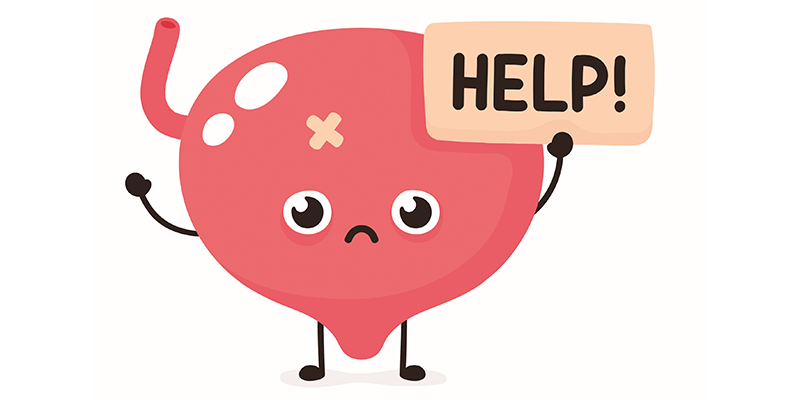Back
How to Address Painful Urination in Men (Dysuria)
By Shannon Strauch, PTA, STMT-1 on 9/19/2023

Painful urination (dysuria) in men can occur because of multiple different reasons.
Urinary Tract Infections (UTIs): UTIs can cause a burning sensation and discomfort during urination. They are often accompanied by a frequent urge to urinate and cloudy, bloody, or foul-smelling urine.
Sexually Transmitted Infections (STIs): Certain STIs, such as chlamydia and gonorrhea, can lead to painful urination. These infections may also cause other symptoms like discharge from the penis.
Prostatitis: Inflammation of the prostate gland (prostatitis) can cause discomfort or pain during urination. Prostatitis can be acute (sudden onset) or chronic (long-term).
Kidney Stones: If a kidney stone travels down the urinary tract and irritates the urethra, it can lead to painful urination.
Urethral Stricture: A urethral stricture is a narrowing of the urethra, which can cause difficulty and discomfort when urinating.
Bladder or Kidney Infections: Infections in the bladder or kidneys can cause pain and discomfort during urination, along with other symptoms like fever and back pain.
Irritants: Certain substances, such as harsh soaps, lotions, or chemicals, can irritate the urethra and lead to painful urination.
Trauma or Injury: Injury to the genital area or urethra can result in painful urination.
Medications: Some medications or medical treatments may cause urinary discomfort as a side effect.
Pelvic Floor Physical Therapy can be beneficial for men experiencing painful urination due to these conditions. This therapy focuses on strengthening and optimizing the pelvic floor muscles, which play a crucial role in urinary function. Here's how pelvic floor therapy can help with painful urination in men:
1. Addressing Pelvic Floor Dysfunction: Pelvic floor dysfunction can contribute to painful urination in men. This dysfunction may include muscle tension, weakness, or improper coordination of the pelvic floor muscles. Pelvic floor therapy aims to correct these issues by teaching men how to relax and contract these muscles appropriately.
2. Treatment of Prostatitis: In cases where painful urination is related to prostatitis (inflammation of the prostate gland), pelvic floor therapy can help alleviate symptoms. The therapist can provide techniques to reduce tension and congestion in the pelvic region, which may help ease discomfort during urination.
3. Pain Management: Pelvic floor therapy can provide techniques and exercises to manage and reduce pain associated with painful urination. These may include relaxation techniques, stretching exercises, and biofeedback.
4. Education: A key component of pelvic floor therapy is patient education. Men will learn about their pelvic anatomy and how to maintain proper pelvic floor function. Understanding how to contract and relax these muscles correctly can contribute to improved urinary function.
5. Tailored Treatment Plans: Pelvic floor therapy is highly individualized. Therapists assess each patient's specific symptoms and needs to create a customized treatment plan. They may use manual techniques, exercises, and other modalities to address the underlying causes of painful urination.
6. Treatment for Urethral Stricture: In cases where a urethral stricture (narrowing of the urethra) is causing painful urination, pelvic floor therapy may complement other medical treatments. The therapist can work on relaxation techniques to ease the discomfort associated with this condition.
It's important to note that pelvic floor therapy should be administered by a trained and qualified Pelvic Floor Physical Therapist. If you are experiencing painful urination and believe that pelvic floor dysfunction or related issues may be contributing to your symptoms, consult a healthcare provider. They can refer you to a pelvic floor therapist or another specialist who can assess your condition and recommend appropriate treatment, which may include pelvic floor therapy.
When to Seek Medical Attention:
If you or someone you know is experiencing painful urination, it's essential to consult a healthcare professional. They can diagnose the underlying cause and recommend appropriate treatment. Additionally, if you experience any of the following symptoms along with painful urination, seek immediate medical attention:
Blood in the urine
Fever
Back or abdominal pain
Frequent urination
Urgent need to urinate
Discharge from the penis
Pain in the testicles
Ignoring these symptoms can lead to complications, so it's crucial to address them promptly.
If you or a male in your life is experiencing pain with urination, reach out to us at Pelvic Health Center in Madison, NJ to set up an evaluation and treatment! Call us at 908-443-9880 or email us at receptionmadison@pelvichealthnj.com.
Read More:
Fascial Counterstrain of the Musculoskeletal System By Shannon Strauch, PTA, STMT-1 on 10/21/2024 How treating cartilage and fascia can help reduce joint pain and improve organ function The Impact of Long-Distance Cycling on the Pelvic Floor: Pudendal Nerve and Pelvic Dysfunction By Dr. Christine Martirez PT, DPT on 10/18/2024 Learn how long distance cycling can impact the pelvic floor
Are you ready to live pain free?
Request An Appointment